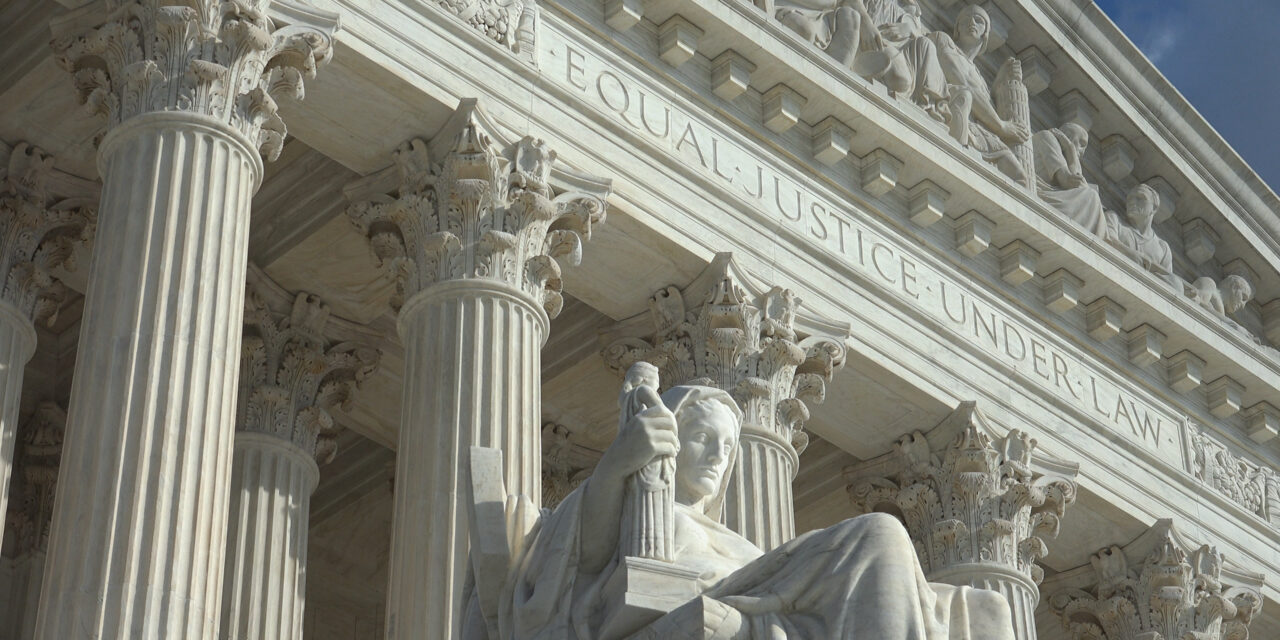The Supreme Court heard oral arguments in Murthy v. Missouri Monday, continuing litigation in a case that could redefine America’s understanding of the First Amendment.
Murthy — which was originally designated Missouri v. Biden — concerns how much influence the federal government can exercise over content on private social media platforms.
Louisiana and Missouri filed the case in 2022, alleging the federal government violated the First Amendment in 2020 by coercing social media companies to take down or suppress posts about the COVID-19 pandemic, 2020 presidential election, and other controversial topics.
Murthy gained momentum last year when Andrew Bailey and Jeff Landry, Attorneys General for Missouri and Louisiana, respectively, asked a judge to stop the government from “coercing and colluding” with social media companies until the case’s conclusion.
“The overwhelming evidence is clear,” Landry said of the thousands of government documents reviewed by the states, “The highest levels of our federal government are suppressing the First Amendment rights of Americans who have opposing views.”
The evidence persuaded two lower courts to restrict communication between the government and social media companies. In July, Judge Terry A. Doughty, Chief United States District Judge for the Western District of Louisiana, issued a preliminary injunction preventing six government entities —including the White House, Federal Bureau of Investigation, and Centers for Disease Control and Prevention — from “urging, encouraging, pressuring or inducing in any manner the removal, deletion, suppression, or reduction of content containing protected free speech.”
The U.S. Court of Appeals for the Fifth Circuit largely upheld Doughty’s ruling in September, finding “numerous federal officials coerced social-media platforms into censoring certain social-media content, in violation of the First Amendment.”
Now that Murthy has reached the highest court, the Justices must decide whether the government’s conduct in 2020 warrants upholding the Fifth Circuit’s ruling forbidding the White House, FBI and CDC from “taking actions, formal or informal, directly or indirectly, to coerce or significantly encourage social-media companies to remove delete, suppress or reduce, including through altering their algorithms, posted social-media content containing protected free speech.”
In their courtroom comments Monday, the Justices considered several arguments. Justice Alito seemed to be leaning toward upholding the lower court’s restrictions, arguing that the offending officials coerced social media companies into censoring material with veiled threats of prosecution.
Justices Kavanaugh and Coney Barret seemed concerned with the way the injunction could impact the government’s ability to protect citizens’ physical safety, asking whether the restrictions allowed for the government to remove posts threatening the safety of American troops, or revealed the home address of a public official.
Justice Brown Jackson, however, seemed more worried about the way the First Amendment curtails government power.
“My biggest concern is that your view has the First Amendment hamstringing the government in significant ways in the most important time periods.” Brown Jackson addressed the state’s attorney, Benjamin Aguiñaga. She continued:
Brown Jackson implies the First Amendment shouldn’t hamstring the government in what it deems “the most important time periods.”
But the First Amendment was crafted and implemented specifically for that purpose — not to protect the government’s power, but to prevent it from growing too large. America’s founding fathers wanted to stop the nation’s fledgling government from becoming tyrannical monarchy, like the one it had just seceded from.
Thomas Jefferson was one of many who knew freedom of speech would be crucial in limiting a government’s power and preserving individual rights.
We can’t know how the Supreme Court will rule on Murthy v. Missouri, but it is the Daily Citizen’s fervent hope that the Court’s decision will not rest on Brown Jackson’s belief that the First Amendment should come second to government’s authority to unilaterally censor speech it deems “threatening.”
Freedom of speech was enshrined in the Constitution to prevent such an idea from prevailing.
The Daily Citizen will update you as the case progresses. A decision is expected by June 2024.
Additional Articles and Resources
Court Rules Government Violated First Amendment with Social Media Censorship
Judge Rules Against Federal Government Censoring Speech on Social Media
States Sue Feds for Colluding with Big Tech to Censor Conservative Viewpoints
‘The Twitter Files’ – Elon Musk Releases Details of New York Post Censorship
‘The Twitter Files Part Two’ – Documentation of ‘Twitter’s Secret Blacklists’






